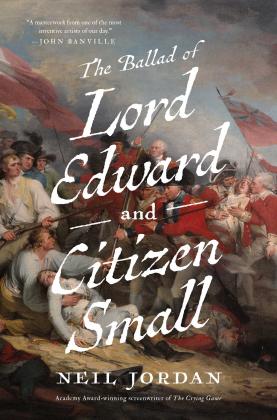
| Format | Hardcover |
| Publication Date | 05/02/23 |
| ISBN | 9781639364534 |
| Trim Size / Pages | 6 x 9 in / 352 |
From Academy Award-winning film director Neil Jordan comes an artful reimagining of an extraordinary friendship spanning the revolutionary tumult of the eighteenth century.
South Carolina, 1781: the American Revolution.
An enslaved man escaping to his freedom saves the life of Lord Edward Fitzgerald, a British army officer and the younger son of one of Ireland's grandest families.
The tale that unfolds is narrated by Tony Small, the formerly enslaved man who becomes Fitzgerald's companion—and best friend. While details of Lord Edward's life are well documented, little is known of Tony Small, who is at the heart of this moving novel. In this gripping narrative, his character considers the ironies of empire, captivity, and freedom, mapping Lord Edward's journey from being a loyal subject of the British Empire to becoming a leader of the disastrous Irish rebellion of 1798.
This powerful new work of fiction brings Neil Jordan's inimitable storytelling ability to the revolutions that shaped the eighteenth century—in America, France, and, finally, in Ireland.
Neil Jordan is an Irish film director, screenwriter, and novelist. His first book, Night in Tunisia, won the Somerset Maugham Award and the Guardian Fiction Prize. He is also the winner of the Rooney Prize for Irish Literature, the Irish PEN Award, and the Kerry Group Irish Fiction Award. Jordan's films include Angel, the Academy Award-winning The Crying Game, Michael Collins, and The Butcher Boy. Neil lives in Dublin.
Buy it now in print:
Buy it now in ebook:
"Very little is known of Tony Small, the formerly enslaved man who was the servant and companion of Edward Fitzgerald, a prominent 18th-century figure in the cause of Irish nationalism. In The Ballad of Lord Edward and Citizen Small, the director and screenwriter Neil Jordan co-opts Tony as a narrator, giving him an affectionately acerbic perspective on the strengths and weaknesses of a man who begins the novel as a loyal member of the king’s army, fighting against the American rebels. This is just one of the many dramatic episodes in Fitzgerald’s short but wildly eventful life. Jordan has a wonderfully varied cast to work with." Alida Becker, The New York Times Book Review
"Irish film director Jordan offers a gripping ballad of 18th-century revolutions on both sides of the Atlantic. At its core is the unlikely friendship between two historical figures: Tony Small, an illiterate man born into slavery in South Carolina, and British soldier Lord Edward FitzGerald. This fast-paced epic will have readers hooked. Publishers Weekly
Advance praise for The Ballad of Lord Edward and Citizen Small:
"A masterwork from one of the most inventive artists of our day.” John Banville, Booker Prize-winning author
"Jordan is a writer of uncommon talent, particularly around pacing and visual description.” The Irish Times
"The historical research is evident [and] as with his previous novels, Jordan creates an evocative sense of time and place. Although the book is an odyssey, tracking thousands of miles across the globe, the pace is leisurely. An atmospheric take on a fascinating friendship." The Times (London)
"Neil Jordan is one of Ireland's greatest, if ever-so-slightly unsung, novelists." Hot Press
"The historical facts are here, in this beautiful work, laid out like a Dublin street ballad." The Sunday Independent (Ireland)
"This panoramic, painstakingly researched novel—told through Small's voice—is a convincing reconstruction of the way their lives interlocked despite origins in diametrically opposed worlds.” The Irish Independent
"This strange relationship—of indenture, but also of mutual need—defines this thrillingly written, gripping tale that revisits many of Jordan’s lifelong preoccupations with class, Irishness, and sexuality to powerful moving effect." The Guardian
"This strange relationship—of indenture, but also of mutual need—defines this thrillingly written, gripping tale that revisits many of Jordan's lifelong preoccupations with class, Irishness and sexuality to powerful moving effect.” The Observer (London)